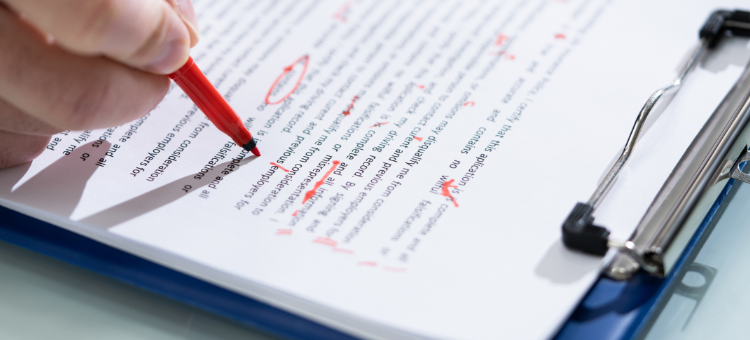The process of writing a university assignment is lengthy and every student needs to follow. It includes knowing what the topic is, doing thorough research, creating and following an outline and finally ends with editing. It can make your task result in A+ grades. However, another part of the project, that is Proofreading, is a process that students do end up missing. Hence, you must not try to avoid it due to the advantages that it poses.
What You Should Know First?
Being the final step in the process of writing university assignments, you must review your tasks just after the completion of your work. You should do a thorough overview of your assignments in order to ensure that they are completed and edited correctly and receive good ratings.
For example: Reviewing can be broken down into three sections, such as language and grammar corrections and editing the context. Furthermore, you must review the parts of your assignment that you are unsatisfied with. They might relate to grammar, language, etc. therefore, verify that your project complies with the academic requirements.
Importance of Proofreading
The majority of students are typically aware that reviewing your task is a step in the process of creating academic writing. That is why avoiding typos, grammatical errors, or general problems in your work and presentation is beneficial. So, you need to review assignments effectively and create professionalism that offers crucial facts that can impact your overall credibility and grades. Hence, it is worthwhile to invest a few minutes to avoid receiving a poor grade for your assignments.
Tips To Score Best Grades With Assignments
This is very true, and far too frequently, the clarity and presentation of your tasks determine how well you receive grades on them. The following guidance can assist you in writing projects that receive exceptional grades:
Recognise The Requirements
It will be beneficial if you focus especially on the formatting and reference section of the instructor’s guidelines.
Arrange Your Content
By organising the work in this manner, you can prevent misunderstandings and help the reader and yourself understand the network of ideas.
Write Precisely and Clearly
Reduce the number of words you use and instead make your work clear and concise.
Verify Your Referencing
Referencing is an honest way to do your work because it is created by other authors, and a proper reference supports the point. Once more, confirm that the referencing style is according to the academic requirements of your task.
Review Carefully
This is because errors in grammar, punctuation, and spelling can significantly lower the quality of your work. Hence, before submitting your task, there is always a good reason to spend some time reviewing it. Therefore, you will avoid every academic writing error after this.
You Must Go Through Each Proofreading Strategy
It implies that the procedure needs to be organised. The following techniques will help you improve your academic writing:
Take A Break
After finishing an assignment, don’t start working on it right away. Instead, wait a few hours or perhaps the next day. In this manner, you will be less likely to foresee errors, and you may quickly return to the text after the break.
Read Out Loud
Another method is to proofread the material twice: once aloud and once through the normal reading style.
Make Use of Reviewing Resources
Tools like Grammarly and ProWritingAid are useful for simple errors that many people make, but they shouldn’t be used in place of reviewing.
Verify Formatting
Verify that the font size, margins, and between-line space are all set up correctly on your page. Consistency in headings and subheadings is also crucial.
What Are The Benefits of Reviewing Your Task?
In addition to improved grades, students benefit from reviewing in a number of ways.
Here are a few main benefits:
Improved Clarity
Editing helps you refine your arguments and ensures that your ideas are communicated to the reader in the most effective manner.
Professionalism
A well-designed assignment demonstrates diligence and meticulous attention to detail, which impresses teachers.
Decreased Stress
You will feel more confident when turning in your assignments if you know that someone else proofread your work.
Skill Development
Based on my experience, reviewing constantly enhances your writing and material analysis, which is crucial for both working and studying.
Error-Free Work
Failing to fix spelling, grammar, and other associated issues, whether intentionally demonstrates concern or proficiency. Thus, following such a structure will help you avoid common mistakes in assignments.
Mistakes To Avoid During Reviewing
One may wonder why there must be such errors at all when reviewing is typically done in a hurry or not at all. The following are some typical errors that students make during reviewing:
Totally Dependent On Tools
Although reviewing programs do the task of correction, they can overlook context-sensitive errors or suggest inappropriate corrections.
Skipping The Process
Due to time constraints, the majority of them do not proofread their work, which leads to the submission of lower-than-average work.
Ignoring Small Mistakes
When the first mistakes are made, one realises that even minor mistakes like misspelled words and punctuation can significantly reduce the overall appearance of the specific document.
Conclusion
For university projects to be of a high quality overall, Proofreading is essential. Even though creating an assignment can seem like a long and difficult process, it is the last crucial step in making sure your work is flawless, understandable, and error-free. By taking the time to proofread your work, you can improve the presentation overall and make your ideas more professional and clear. You can also get rid of spelling and grammar errors. And if you are looking for experts to professionally do your work, then take Assignment Help Australia.






